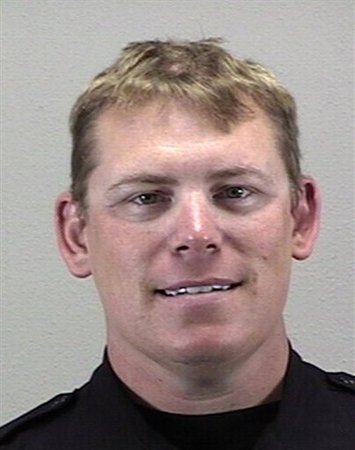Evil leftist media still rationalizing murders of whites by blacks as a response to white injustice

Police officer Mark Dunakin, slain by Lovelle Mixon

Lovelle Mixon
Paul K. writes:
Lovelle Mixon, a black parolee with a long history of violence, shot and killed four police officers in Oakland over the weekend. I was struck by the following paragraphs at the end of an article about the incident:
People lingered at the scene of the first shooting. About 20 bystanders taunted police.
Tension between police and the community has risen steadily since the fatal shooting of unarmed 22-year-old Oscar Grant by a transit police officer at an Oakland train station on Jan. 1.
That former Bay Area Rapid Transit officer, Johannes Mehserle, has pleaded not guilty to a murder charge. A preliminary hearing is scheduled for Monday. Violent protests erupted on the streets of Oakland in the weeks after Grant’s death, further inflaming tensions.
This seems to be another example of the media’s inclination to couch appalling crimes committed by blacks in the context of racial discrimination or an ongoing “cycle of violence.” What is the purpose of bringing up the shooting of Oscar Grant while covering this story? When the Oscar Grant shooting was originally covered, did the reporter make a point of mentioning the wildly disproportionate crime rate among blacks to provide context? Are we supposed to believe that Mixon and the low-lifes who taunted police at the scene of his crime were acting out of a frustrated sense of justice? Has there ever been a time when inner city blacks have not demonstrated hostility to the police? Is a tragic error committed by a police officer comparable to deliberate, wanton slaughter committed by a black criminal?
I found even more revolting coverage of the case in the Boston Herald. I quote the opening paragraphs:
OAKLAND, Calif.—Lovelle Mixon’s relatives say they could tell his frustration was building inside.
After serving the better part of the last decade behind bars, the 26-year-old was free again in November.
He planned to do better, family members said, and he wanted to meet the requirements mandated by his second time on parole.
The only problem is he did not know how.
“He didn’t know really where to start,” said Mixon’s wife Amara Langston, 25. “He was trying to make himself a better person and trying to realize his mistakes and what he was doing was wrong.”
Mixon tried to abide by the terms of his parole, the family members said, but obstacles continued to block his path.
His parole officer stood-him up when they had planned a meeting, family members said. He couldn’t find a job. He was depressed.
“He wasn’t being treated right and wanted to get rehabilitated and find a job,” said Mixon’s uncle Curtis Mixon.
It goes on.
This attempt to put the reader in murderer’s shoes, to sympathize with his difficulties, is utter nihilism. The New York talk-radio host Bob Grant had the correct understanding of fiends like Mixon: “He has served notice on society that he is not fit to live among us.”
Posted by Lawrence Auster at March 24, 2009 05:01 PM | Send

